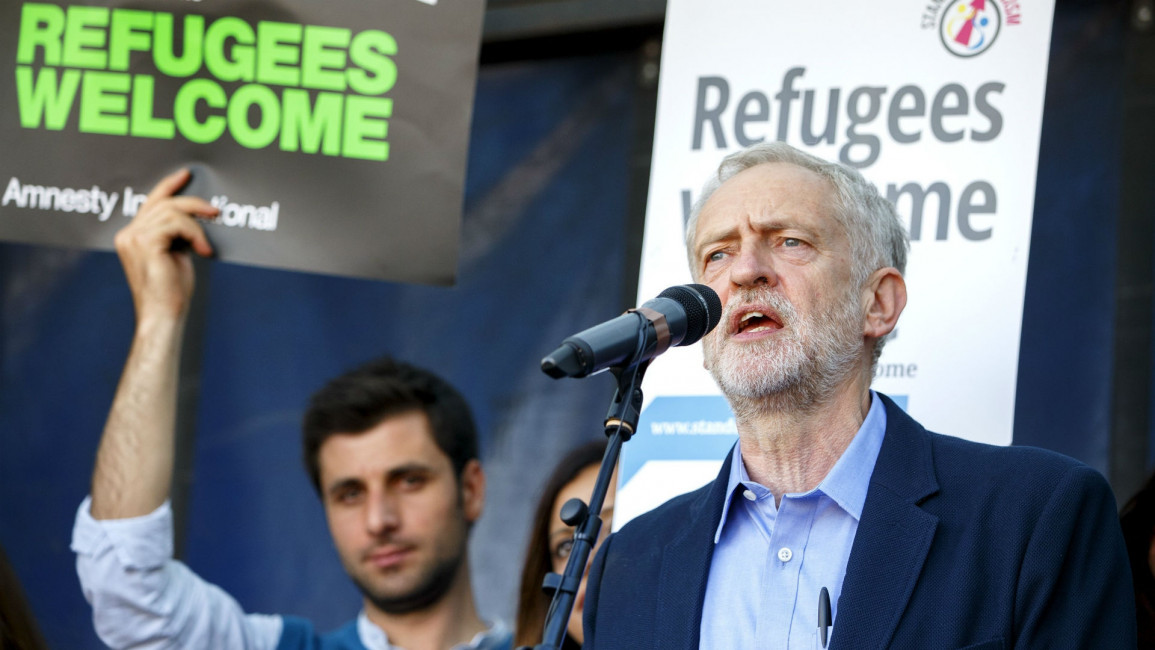
Corbyn's Middle East vision stricken in Syria
Over Syria, Jeremy Corbyn lost the vote but won the argument.
On the back of this, the parliamentary Labour Party must decide whether to back their leader's vision for a new Middle East policy or continue to impede his attempts to effectively challenge the government's agenda.
British Prime Minister David Cameron's case for war was as unconvincing as the attempts by parliamentarians to pronounce "Daesh" - the Arabic acronym for the Islamic State group - yet he secured a comfortable victory by 397 votes to 223 with 66 Labour MPs supporting him.
Government fear of Corbyn's anti-war credentials was evidenced by their refusal to allow two days' of debate before the vote.
And when Prime Minister David Cameron called Corbyn and others planning to vote 'no' "terrorist sympathisers" it was another sign that the government was intent on shrill statements rather than rational debate.
Cameron's case for war was shallow.
He stated that the UK "must pursue a comprehensive strategy that also includes political, diplomatic and humanitarian action" and talked of "post-conflict stabilisation and reconstruction" but did not provide detail.
The Prime Minister chose emotional and evocative language to back up his case, calling ISIS "women-raping, Muslim-murdering, mediaeval monsters".
Cameron's case was that airstrikes would stop ISIS plots against the UK, many of which he claimed are formed in Syria.
He also stated that "failing to act would be to betray… the wider religion of Islam in its very hour of need".
 |
British Prime Minister David Cameron's case for war was as unconvincing as the attempts by parliamentarians to pronounce Daesh |  |
His support for the invasion of Iraq and his ordering of the calamity in Libya make Cameron's claims of having a serious strategy for stability in the region and concern for Islam highly suspect.
His more telling comments were those made about "standing by our allies" to preserve the UK's international reputation.
Cameron is concerned with issues of British prestige, and relations with allies such as the United Sates and the Gulf dictatorships and his policy should be seen within this context.
Opposition leader Corbyn also has his interests and constituency, based in the anti-war movement and the belief in alternatives to perpetual war.
In challenging the government's case for war in Syria, Corbyn picked Cameron's argument apart piece by piece exposing its lack of serious strategic planning including the issues of ground troops, serious diplomatic initiatives, the possible worsening of the refugee crisis, civilian deaths and the terrorist threat to the UK.
Corbyn tried to shift the debate to whether the airstrikes would increase terror in the UK and Middle East.
The Labour leader called the government's plan an "ill thought-out rush to war" and stated that Cameron had rejected a two day debate because of growing public opposition.
Specifically, on Cameron's claim that 70,000 "moderate" Syrian ground troops are ready to replace ISIS, Corbyn said there are "no such forces" and that if ISIS fell, it would be other jihadi or Salafist groups that would fill the power vaccum.
Corbyn's alternative vision was to use UN Resolution 2249 as "a framework for joint action to cut off funding, oil revenues and arms supplies from Isil [IS]".
He claimed that with regional input, a "broad based government" could be established in Syria and internationally-backed regional forces could then re-take territory now controlled by IS.
He criticised the Conservative government for instead using 2249 to pursue a "bomb now, talk later" strategy.
It was left to Corbyn's Shadow Foreign Secretary, Hilary Benn, to steal the show and take the accolades of an appreciative Conservative party.
Benn's speech was also heavy on emotional language and the cliches of 'humanitarian intervention' – "moral and practical duty", "eradicate the safe haven", "play our part", "what message would (not acting) send?", "faced by fascists" – in place of substance.
Benn even compared UK airstrikes on Syria to the international brigades who signed up to fight Franco's fascism in Spain.
It went down a treat in the House of Commons, and Benn was soon being touted as a replacement for Corbyn and a future Prime Minister.
Both Cameron and Benn need the news from Raqqa over the coming months supports their grandstanding.
Civilian deaths or the electricity and water outages like those caused by French airstrikes on the city would weaken their moral case significantly.
Corbyn was unable to persuade pro-war MPs to engage in a more far-reaching debate.
He also faced significant opposition in his own party from those who seek to undermine him at every turn.
By allowing a free vote to Labour MPs, Corbyn revealed the dilemma he faces in balancing his pluralistic, pragmatic approach and exercising his huge mandate to lead.
The Labour leader's problem is that he was left with very little to choose from when selecting his shadow cabinet.
Few of his supporters in parliament had the required experience to take a front bench role, and a number of high profile MPs publicly declared they would never serve in a Corbyn cabinet.
What he is left with is a team that can just be about described as centre-left and a shadow foreign secretary who is ignoring the recent history of intervention in the Middle East.
Being proved right on every military intervention since 9/11 has not been enough for Corbyn to win over the whole parliamentary Labour party, but he will be emboldened by huge support for his opposition to the bombing among party members and by the majority of his shadow cabinet backing his stance.
The Labour leader may eventually strengthen his hand sufficiently to influence the UK's Middle East policy, but for those on the receiving end of the UK's latest airstrikes in the region, the machinations and changes taking place in Westminster fall al long way short of improving things on the ground.
Tom Charles is a London-based writer, editor and literary agent. He previously worked in the UK parliament, including as a lobbyist for Palestinian rights. He has contributed to Jadaliyya and the Journal of Palestinian Refugee Studies. Follow him on Twitter: @tomhcharles
Opinions expressed in this article remain those of the author and do not necessarily represent those of The New Arab, its editorial board or staff.




